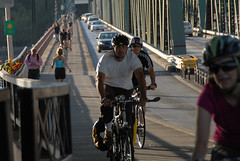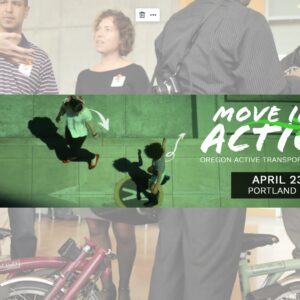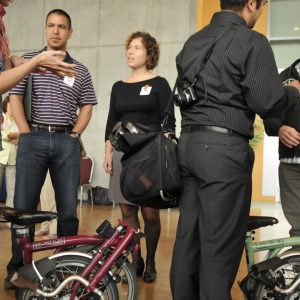U.S. Congressman Earl Blumenauer (D-OR) is looking to introduce a new bill to Congress next week that would create a $2 billion grant program that would hasten investment in biking, walking, and other “active transportation options”.
Blumenauer’s office sent out a one pager and a PDF of the bill today, saying that the proposed legislation has already been vetted with national organizations and leaders, but that they are currently in negotiations to secure a Republican co-sponsor. The bill would look to increase mode share for biking and walking through “concentrated funding for active transportation networks”. “It is time for the federal government to support communities’ infrastructure investment,” the statement says.
This proposed legislation might sound familiar. Back in March 2007, the Rails to Trails Conservancy began a national campaign to identify 40 communities that would receive $50 million dollars each to invest in biking and walking. Portland was an early and front-running contender to be one of those . However, according to sources, that program stalled for a variety of reasons, including the fact that it looked too much like earmarks.

(Download PDF of bill here)
This new legislation from Blumenauer’s office would be different in that it’s a competitive grant program (with a two-year application cycle). The grants would range from $5 to $15 million for five years.
Lake McTighe, who’s in charge of Metro’s Active Transportation Partnership, shared at our event last night that she’s already planning to submit an application.
Tighe told me on the phone this evening that, “We’re developing the projects and the case [for active transportation] so we can be competitive for these types of funding opportunities. The language of the bill is very on track for the direction we’re moving in.”








Thanks for reading.
BikePortland has served this community with independent community journalism since 2005. We rely on subscriptions from readers like you to survive. Your financial support is vital in keeping this valuable resource alive and well.
Please subscribe today to strengthen and expand our work.
I was just wondering about bike funding, and consequently, taxes.
I remember y’all Portlanders talked about taxing new bike purchases to fund bike infrastructure, and it wasn’t so popular, but I wonder if that had been, say, a half-cent sales tax instead? Sure, sales taxes are regressive, but most folks who walk and bike and take transit are poor to working-class, so they’d (we’d) benefit the most, too.
in any case, i like the ‘b’ (for ‘billion’). more money is a good thing.
Marin County (just on the other side of the Golden Gate Bridge from SF) is one of four communities in the US that got $25 million each to do walk and bike improvements. it’s been fun to watch the improvements happening. big projects. small projects. $25 million can do a lot.
I’m glad Earl has the guts to go for Billions. That means 200 to 300 grants of 7.5 million on average. It means jobs for grant writers, transit geeks, and construction workers. These are jobs that create systems that keep local money local.
I wonder what the law says to prevent a car project masqueraded as active transit? We’ve all seen too many DOT engineers do greenwashing. They paint a few unconnected segments of road as “bike lanes”.
This law would fund a freeway with a bike lane shoved underneath. AKA our greenwashed CRC bridge.
FYI. By the time this passes, the CRC will be submitting grant applications. The CRC will create construction jobs, and when finished send our local dollars into the hands of the oil companies.
“but most folks who walk and bike and take transit are poor to working-class”
I don’t think this is true at all. I see a lot of thousand dollar plus bikes on the hawthorne bridge in the am. I think we as a community need to target more alternative transporations projects to periphery (the outlying areas where the socio-economically “cleansed” live).
“Portlanders talked about taxing new bike purchases to fund bike infrastructure”
I would happily pay a tax on anything above a certain limit — say $400.
Peter, do you live in a state with sales tax already? If you do, I can see where you would think that a tax at the point-of-sale would be a good idea.
In order to have a “bike sales tax” in Oregon, an entire tax collection system would have to be created from scratch. That would cost the state a pretty penny, not to mention merchants who don’t currently have do deal with a sales tax.
I think this is one of the cases where the cost of implementing and collecting the tax wouldn’t be worth the amount of revenue collected. If were were a state with a sales tax in the first place, it would be totally different.
we do have a dmv in this state. a simple registration fee would be more fair as many cyclists do not purchase new bikes or they could cross into washington and avoid a sales tax. I would only apply it to those 18 and over and free for disabled. Than they can ride guilt free as they would be contributing to road costs, not just out for a free ride.
#6
What about the unemployed?
What about the homeless?
Do they get to ride a bicycle for free in your everyone is registered utopia?
Registering cyclists is like the idea of making people register to become parents: sound good on paper, to some, but due to the fact that we live in a land of freedoms it can not be law.
I’d love to believe that requiring cyclists to register with the DMV would encourage more educated cycling amongst the populace but we can easily see that registering has had no similar effect on auto drivers.
What about homeless people that drive cars (yes they exist) do you think they should register, insure…
Jim, if you can show me the numbers that prove bike registration is more than just a make-work program for state employees, I’d be willing to give it some serious consideration. Meantime, the only numbers I have ever seen would indicate that there isn’t even enough money collected to pay for the bureaucracy needed for a registration program.
And Jim – please tell me which insurance companies offer policies for cyclists who don’t also own a motor vehicle? I’ve been looking for one for 3 years and haven’t found one yet.
The insurance companies tell me when I call to enquire that it wouldn’t be profitable to offer such a policy.
AAA
govt dosen’t do anything efficiantly. It might be run efficiant if it were farmed out. Wait till they start running health care $$$
I wasn’t sugesting bikes should have to carry ins.. I never shoped for it, maybe it is too high risk?
A friend who used to be an insurance adjuster told me it’s not profitable because they couldn’t charge the same exorbitant rates for bikes that they do for motor vehicles. Since people driving motor vehicles are far more likely to be in collisions than people riding bicycles, I can’t see how it would be higher risk than insuring drivers.
if i ran into a bike at 20 mph and ran into a car at 20 mph, who do you you think would be at the most risk of sustaining expensive injuries?